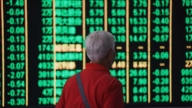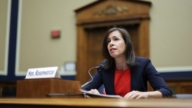【新唐人2014年01月25日讯】北京一些购买了银行和保险公司的投资产品客户,日前愤怒的向有关部门申诉他们10亿元人民币的投资损失,因为他们的投资到期后,银行不能兑付。无独有偶,江苏盐城市多家“农民资金互助合作社”,最近也陆续出现“人去钱空”的现象,好几千户民众因数亿元存款无法兑现而讨说法。这是中国影子银行业陷入“钱更荒”的最新证据吗?请看报导。
北京市的一个公安分局门前,22号,聚集了十几名投资者,他们要求公安局找回他们的血汗钱。
北京市民何玉京购买了人民币100万元、预期年收益率10%的“北京融典投资管理有限公司(Beijing Roll-In Investment Co.)”的基金。他说,之所以购买这款产品,就是因为本金、利息都有担保。但是,现在,既没有拿到承诺的收益,连本金也没有拿回来。
重庆市的一名投资者万霞也表示:融典,什么钱也没付给他们。
“融典”产品的销售对像,包括:中国平安保险股份有限公司、兴业银行、国建设银行、民生银行等大型金融机构的客户。
投资者们还说,投资公司提供的发售说明书上有标准的风险披露,但表示,投资者的本金和利息,将由第三方提供担保。
据了解,“融典”总额达10亿元的基金,是投资到成都市政府支持的几个公共住房项目上。
“融典事件”不是中国影子银行体系的一个个案。
江苏省盐城市,近年开设了数十家所谓“农民资金互助合作社”,这些合作社的审批单位是当地的农业主管部门。开始时,合作社向储户承诺,存款到期后不仅可得利息,还能分红,从而吸引了大批当地民众存款。
但从去年初开始,合作社陆续出现钱荒。目前很多合作社已经无钱兑付而关门。
其实,目前盐城市还有一些地方政府批准的投资公司也出现了问题,不仅公司关门,负责人也逃之夭夭。
当地民众开始到政府讨说法。
美银美林(Bank of America Merrill Lynch)的分析师,在1月16号发布的一份报告中说,影子银行贷款出现违约的速度,似乎在迅速加快。
例如,“中诚信托投资有限责任公司(China Credit Trust Co.) ”和“中国工商银行”,最近几周面临越来越大压力,它们需要避免让投资者面临30亿元人民币的损失,而这笔投资产品,是通过“工商银行”出售给投资者的。
大陆金融分析师任中道:“局部性、区域性的危机已经开始爆发了。就拿信托来说,去年就有十几款出现兑付危机,目前到月底还有一个信托也出现兑付危机。其实这个风险已经是很大了。”
大陆金融分析师任中道表示,中国仅银行理财部分,已达到11万亿的规模,如果不能正常兑付,老百姓损失非常大。但在银行没有公开的破产条例上,银行对理财产品不负有责,投资者得自担风险。
大陆“广发证券”2012年底发布的研究报告——《阳光下的影子——中国影子银行分析》说,目前从广义信用中介角度测算,中国影子银行总规模大约在30万亿左右。
对于如此大规模的影子银行,中国银监会首席顾问沈联涛去年9月却声称,“中国影子银行风险完全可控,个别有问题,但是系统没有问题。”
中国民间投资顾问郑先生:“审计署最近一个通告,各地政府负责偿还的债务共20多万亿,这是天文数字。20多万亿,如果这个钱要拿出来还的话,从哪里把钱变出20多万亿?”
中国民间投资顾问郑先生指出,中共地方政府联合银行把很多债务转嫁到担保公司、信托控股、信用社等第三方上,让他们去接盘。但这些利用了民间热钱的第三方,会率先出问题。
郑先生认为,地方债带来的金融风险不可避免。
美国“南卡罗莱纳大学艾肯商学院”教授谢田指出,“影子银行”和“地方债”注定要破产。破产的时间,就是中共上层决定撒手不管、或想管但又心有余、力不足的时候。而这一天,注定会来到。
采访/易如 编辑/宋风 后制/萧宇
Shadow Banking Money Shortage More Severe;
Investors Lose Everything
Some customers who bought investment products at banks
and insurance companies in Beijing recently complained
angrily to relevant departments that they lost money.
When their investments matured, the banks couldn’t pay
back 1 billion yuan.
The same thing happened to several
rural financial cooperative institutions.
Thousands of people appealed as they couldn’t cash
hundreds of thousands yuan in bank savings.
Is this new evidence that China’s shadow banking
has a money shortage issue? Please see the report.
More than 10 investors gathered in front of a public security
branch in Beijing on January 22, asking the public security
to help getting their hard-earned money back.
Beijing citizen He Yujing bought 1 million yuan in the funds
of Beijing Roll-In Investment Co. that was estimated to have
10% yield per year.
He said the reason he bought the product was because
its guarantee for the principal and interest.
But it hasn’t returned the profit it promised
and not even the principal amount.
Wan Xia, an investor in Chongqing City also indicates that
Beijing Roll-In didn’t return anything to them.
The target of Beijing Roll-In includes customers of China
Ping An Insurance Co. Ltd., China Construction Bank,
Minsheng Bank, Industrial Bank, and other large institutions.
The investors also said the investment company has a risk
disclosure on their prospectus that says the principal and
interest of the investors will be guaranteed by a third party.
Beijing Roll-In has funds totalling 1 billion yuan invested in
several public housing projects supported by Chengdu City.
The Beijing Roll-In case is not a single case
in China’s shadow banking system.
Several dozen rural financial cooperative institutions were
opened in Salt City of Jiangsu Province in recent years.
The local agricultural department is the unit
to approve these cooperative institutions.
At the beginning, the cooperative institutions promised
depositors that they get not only interest but also a bonus
when the deposit matures, which attracted many local
residents to deposit money there.
But the cooperative institutions started to have
money shortage since the beginning of last year.
A lot of the cooperative institutions have shut down,
because they have no money to pay back.
In fact, some investment companies approved by local
government in Salt City have also had problems.
Those companies closed, and
the responsible persons escaped.
Local residents have started to seek
explanations from the government.
In a report published on January 16, analyst of Bank of
America Merrill Lynch says breach of contract among
shadow banking seems to appear more and more often.
For instance, China Credit Trust Co. and Commercial Bank
of China have had more and more pressure in recent weeks.
They need to avoid 3 billion yuan of loss to the investors.
Those investment products were sold
to investors via Commercial Bank.
Ren Zhongdao, Mainland financial analyst:
“Localized, regional crisis has already begun.
Take trusts as an example, there were 10 trusts with a pay
out crisis, and there’s another one by the end of the month.
The risk has already become very big."
Ren indicates that China’s bank financing has reached
1.1 billion yuan.
If they can’t pay money back, everyday peoples’ loss
will be extremely big.
But on the Bankruptcy Ordinance of banks, not open to
the public, it says banks are not responsible to financial
products, and investors are at their own risk.
Mainland Guangfa Securities published a research report
at the end of 2012 “Shadows under the sunshine – China’s
shadow banking analysis".
This says the total size of China’s shadow banking is around
30 trillion yuan, based on Guangfa Securities estimation.
Facing such a big size of shadow bankings, however,
China Banking Regulatory Commission chief adviser,
Shen Liantao, said last September, “China’s shadow
banking risk is completely under control.
There are some individual problems,
but there’s no problem with the system."
Civil investment consultant Mr. Zheng: “Recently the Audit
Commission published a notice that local governments are
responsible to pay back more than 2 billion yuan of debts.
That’s an astronomical figure. Where do they get 2 billion?"
Mr. Zheng indicates the Chinese Communist Party (CCP)
local governments unite with banks to pass on the debts to
security companies, trusts holdings, credit unions and other
third parties. But those third parties will have problems first.
Mr. Zheng believes that financial risks due to local debts
are inevitable.
Professor Xie Tian at School of Business in University of
South Carolina points out that shadow banking and local
debts are destined to break.
The time of their bankruptcy is when the CCP high level
decides to give up, or when it wants to take care of it but
has no strength. And this day is destined to come.
Interview/YiRu Edit/SongFeng Post-Production/XiaoYu



























